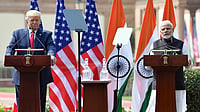Countries made little progress in reaching an agreement on the critical issue of climate finance at the mid-year UN climate talks in Bonn, Germany, even as floods, extreme rains, and brutal heatwaves disrupted lives and livelihoods in several countries.
This also had an impact on other discussions, such as climate change adaptation, greenhouse gas emissions reduction, and climate-related loss and damage.
Negotiators will now have to work extremely hard to achieve success at the UN climate conference (COP29) in Baku, Azerbaijan, where the world will meet the deadline for agreeing on the New Collective Quantified Goal (NCQG).
The NCQG is the new amount that developed countries must mobilise each year beginning in 2025 to support climate action in developing countries.
Some wealthy countries argue that countries with high emissions and greater economic capabilities, such as China and petro-states classified as developing countries under the Paris Agreement, should also contribute to climate finance.
Developing countries, on the other hand, cite Article 9 of the Paris Agreement, which states that climate finance should be directed from developed to developing countries.
Developed countries want the funds to go to the nations most vulnerable to climate change, such as the least developed countries and small island developing states. Developing countries argue that they all deserve assistance.
Developing countries also want clarity on what constitutes climate finance, insisting that development finance should not be counted as climate finance and that funds should not be disbursed as loans, as has happened in the past.
According to climate policy experts at the think tank E3G, the Bonn talks have paved the way for a difficult road ahead, and an increase in political dialogue will be critical to achieving a breakthrough.
According to the independent think tank Centre for Science and Environment, differences between developed and developing countries on the NCQG have deepened rather than narrowed, indicating a long and difficult path to agreement in Baku.
Developing countries made unequivocal demands for grant-based and concessional financing for climate action, claiming that the financial system creates a 'disenabling' environment for finance to reach them.
The G77-China bloc remained united in its demands and increased the ante in its statement at the closing plenary, saying they "cannot go beyond COP29 without defining the NCQG" and that there is a need to "move from conceptual to concrete discussions."
However, developed countries chose to focus on distractions such as increasing the NCQG's contributor base.
"Several developed countries continued to call for the provision of climate finance to be extended beyond just developed countries to include certain developing countries, arguing that this would make the new climate finance goal reflect 'new economic realities'," said Sehr Raheja, programme officer for climate change at CSE, who attended the Bonn talks.
Regarding the NCQG's "quantum," the Like-Minded Developing Countries, Arab Group, and African Group have proposed amounts ranging from USD 1.1 to 1.3 trillion per year. However, developed countries did not engage meaningfully in the discussion of quantum, nor did they propose their own amounts.
According to Harjeet Singh, climate activist and Global Engagement Director for the Fossil Fuel Non-Proliferation Treaty Initiative, climate finance at international talks has devolved into a battleground, a clear sign of developed nations' neglect and deception over the years.
"These (rich) countries have not only avoided their historical responsibilities, but have also consistently used delaying tactics, shifting burdens onto the shoulders of developing countries," he stated.
Tasneem Essop, Executive Director of Climate Action Network International, stated that the outcome of the Bonn climate talks reflects a decades-long struggle to get rich countries to meet their obligations and assist developing countries in taking action to address the climate crisis.
"Unless that deadlock is broken, all other issues (such as mitigation and adaptation) will be held hostage," she stated.
Developing countries have proposed a new climate finance goal, but developed countries have refused to discuss how much public money they are willing to contribute. This is despite the fact that climate finance is critical to preventing climate catastrophe and is a legal obligation under the Paris Agreement and the UN Framework Convention on Climate Change, according to Mariana Paoli, Global Advocacy Lead at NGO Christian Aid.
"This failure by rich countries reflects their lack of political leadership. "The poorest, most vulnerable, and marginalised people require financial assistance today," she stated.
Sindra Sharma, Senior Policy Advisor at the Pacific Islands Climate Action Network, stated that finance is an important enabler of ambitious climate action.
"Achieving the implementation of 1.5 degree-aligned Nationally Determined Contributions (NDCs) requires trillions of dollars in public funding from developed to developing countries," she stated.
Countries must submit their third round of NDCs 9-12 months before the UN climate talks in Brazil next year.
NDCs are national climate plans aimed at achieving the goals outlined in the 2015 Paris Agreement, which include limiting global warming to well below 2 degrees Celsius, preferably 1.5 degrees Celsius, compared to the 1850-1900 average.


























